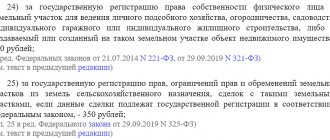Any rights to a land plot must be legalized.
Such rights are subject to state registration by Rosreestr authorities. Registration of the right to use a land plot, the ownership of which belongs to another person, is carried out in any region of Russia, regardless of the location of the land plot.
The complex of registration actions consists of several stages and includes the registrar checking many aspects, starting from the content of documents and ending with the intended purpose and type of permitted use of the land.
What types of land use are there?
Rights to a land plot can take the following forms:
- Rent. The most common form of legalization, which can be used by both citizens and companies for a fee under the conditions specified in the contract;
- Easement. This is a restriction of the right to use land by a person who is not its owner, but has legal grounds for this (for example, the right to place a gas pipeline, water supply; right of passage);
- Free use on an urgent basis. This is the rarest type of legal relationship that arises when an agreement is concluded and the land is the property of its parties;
- Permanent (indefinite) use and the right of lifelong inheritable ownership of land. These types of rights are available only to persons who received such a privilege before 2001, that is, before the adoption of the Land Code of the Russian Federation. Now the land is not formalized in this way, and these forms are gradually losing their relevance.
The main documents confirming ownership of a land plot are a certificate of state registration of rights or a certificate of ownership of land, if the right arose before 1998, and the document on the basis of which this certificate was issued. These documents are title-establishing and title-certifying.
Legal documents include documents in accordance with which the land plot came into the possession of a citizen, for example, a resolution of the head of the district administration on the allocation of a land plot, a purchase and sale agreement, a gift agreement, a certificate of inheritance, or a court decision that has entered into legal force. Title documents include certificates issued after 1998 by the relevant (territorial) institution of justice for state registration of rights to real estate and transactions with it. A certificate of state registration of rights is a document certifying the legal act of recognition and confirmation by the state of the emergence of rights to real estate. State acts, certificates and other documents certifying rights to land and issued to citizens or legal entities before the entry into force of the Registration Law have equal legal force with entries in the Unified State Register of Rights. In particular, the following are recognized as valid and have equal legal force with entries in the Unified State Register of Rights: - certificates of land ownership in the form approved by Decree of the President of the Russian Federation of October 27, 1993 N 1767 “On the regulation of land relations and the development of agrarian reform in Russia” ; - state acts on the right of lifelong inheritable ownership of land plots, the right of permanent (indefinite) use of land plots according to the forms approved by Resolution of the Council of Ministers of the RSFSR dated September 17, 1991 N 493 “On approval of the forms of the State Act on the right of ownership of land, lifelong inheritable possession, perpetual ( permanent) use of land"; — certificates of ownership of land in the form approved by Decree of the Government of the Russian Federation of March 19, 1992 N 177 “On approval of forms of certificates of ownership of land, lease agreements for agricultural land and agreements for temporary use of agricultural land.” On January 1, 2015, a new form of certificate of state registration of rights was introduced (see Order of the Ministry of Economic Development of Russia dated December 23, 2013 N 765 “On approval of the rules for maintaining the Unified State Register of rights to real estate and transactions with it, the composition of the registration number, the procedure for assigning when carrying out state registration of rights to real estate and transactions with it, real estate objects with conditional numbers that have not been assigned a cadastral number in accordance with the procedure established by the legislation of the Russian Federation, forms of a certificate of state registration of rights and a special registration inscription on documents, requirements for filling out a certificate of state registration rights and a special registration inscription, as well as requirements for the format of a special registration inscription in electronic form"). This Order approved not only the form of the certificate of state registration of rights, but also the rules for maintaining the Unified State Register of Rights; composition of the registration number; the procedure for assigning conditional numbers during state registration of rights to real estate and transactions with it to real estate objects that have not been assigned a cadastral number in accordance with the procedure established by the legislation of the Russian Federation; forms of special registration inscription on documents; requirements for filling out a certificate of state registration of rights and a special registration inscription, as well as requirements for the format of a special registration inscription in electronic form. In accordance with Art. 2 of the Federal Law of July 3, 2016 N 360-FZ “On Amendments to Certain Legislative Acts of the Russian Federation”, from July 15, 2021, instead of a certificate of state registration of rights, an extract from the Unified State Register of Rights is issued, certifying the state registration of rights. Thus, from this date, the extract is the only document confirming the fact of such registration and the presence of the information specified in it in the Unified State Register of Rights. At the same time, on the basis of Part 7 of Art. 21 of the said Law, state bodies, local government bodies, courts, as well as other bodies and organizations are required to accept an extract from the Unified State Register of Rights, along with a certificate of state registration, to confirm the registration of rights to real estate. Please note: a membership book and a gardener's book are not documents that can confirm the existence of any right to a land plot, therefore, if you suddenly find that you have nothing except a membership book, then, without delay, register your right to land. Agreements for the lease of a land plot, sublease of a land plot, gratuitous use of a land plot, concluded for a period of less than one year, are not subject to state registration, except in cases established by federal laws (Clause 2 of Article 26 of the Land Code of the Russian Federation).
When registration is not required
Legalization by entering data into the register is always necessary if this is expressly stated in the law. In particular, the obligation applies to lease agreements and land easement agreements. However, there are exceptions. Registration is not required if the term of the lease agreement does not exceed one year or is concluded for an indefinite period.
The copyright holder who received land for use before January 1998 is also not required to go through the registration procedure, but can do this at his own discretion. Such a right is called pre-existing. However, the lack of state registration of a previously arisen right creates certain risks for the copyright holder. Avoidance of mandatory state registration of a previously acquired right to land does not give rise to legally significant consequences for third parties. That is, the actual owner will not be able to prove his status and protect his interest. In addition, counterparties may be required to take legalization actions in court.
Title documents for land
What type of title deed the owner of the plot has is determined by the circumstances of taking possession and by legal precedent. This may be the decision taken back in the Soviet era, according to which plots were allocated. Its relevance continues to this day. There is no need to replace it with more modern certificates.
List of title documents for land; what documents for a land plot are such?
When compiling an exhaustive list of title documents for a land plot in 2019, we include in it:
- administrative acts of federal, regional and municipal authorities, business entities, according to which plots were provided;
- acts confirming the commissioning of the construction project;
- contracts related to property transactions - lease, donation, purchase and sale, exchange;
- certificate of inheritance by will or after the death of the owner;
- extracts from court decisions, settlement agreements.
The main condition for the validity of all the listed documentation is its compliance with the norms of Russian legislation.
For a privatized plot of land, an addition to the title document is required in the form of an administrative state act certifying the transfer of ownership. For a plot purchased from municipal property, this addition is a receipt designed to confirm that the cost of the land plot has been paid.
What documents cannot be title deeds to a plot of land or are invalid for title deeds?
Everyone who is preparing to conclude a transaction under a loan agreement is concerned about what documents should be available so that there are no delays in registration.
Buyers of land plots know that they must be presented with cadastral passports and other samples of technical documentation. However, their presence does not prove in any way that the plot is actually owned by the seller.
The title documents for registration of land ownership also do not include an extract from the Unified State Register of Real Estate, which has replaced the certificate of ownership since 2015. They act as legal documentation. But the relevance of the information they contain needs to be verified.
Copies of the relevant documentation will not be suitable for legal establishment if they have not been notarized.
In what cases is title documentation required for a land plot?
With the introduction of the federal state registration system, rumors are increasingly arising about the obligation or compulsion to draw up title documents for land plots on the part of the state. Almost all owners agree with the need for a federal real estate cadastre and recognize it as rational and vital. For now, the rumors remain just rumors, but their intensity is increasing. After all, the trend showing the intention of state authorities to see all landholdings registered is clearly visible.
At the same time, a considerable part of Russians using land plots for some reason manage without title documents. And he continues to postpone receiving them indefinitely.
The need for title documentation arises:
- if there is a need for property rights registered in the federal register;
- in case of concluding agreements on land plots;
- when a share of property is allocated from an existing plot or divided.
Having such an act, the owner of the land plot has the right to take actions for which it is necessary to confirm his own legal capacity in order to dispose of it.
Validity period of title documentation
Once you receive a deed of title, you don’t have to worry that over time it will lose its relevance and legal force. Until a transaction is completed as a result of which the land will change its owner, there is no talk of annulment. But even in this case, the old act can be used, albeit in a very limited way, to determine the category of land.
The validity of the title documentation will cease (which allows for its cancellation) with the termination of the right of use. This can happen when:
- withdrawal in favor of the state, subject of the federation or municipality due to public need or due to violation of the intended purpose;
- confiscation;
- donations;
- inheritance;
- concluding a property transaction.
Until then, the action continues. Updated information, for example, regarding the boundaries of a land plot, is reflected when replacing technical documentation.
What are the stages of the procedure for legalizing the right to use land?
Registration of the right to use a land plot begins with the preparation of documents, including drawing up an application and paying the state fee. A legal examination is carried out to determine the reliability and completeness of the information and the compliance of the transaction with the law. After submitting documents for registration, the registrar checks whether there are any contradictions related to the right to use a specific object. After this, the updated data is entered into the Unified State Register of Real Estate, and the applicant receives confirmation of registration in the form of an extract. From this moment on, land rights are considered legal. Refusal to register or suspension entails additional stages, including defending interests in the appeal commission of Rosreestr and the court.
The right to own a plot and the grounds for the emergence of property rights
The right of possession, or the right to own a land plot, means the physical possession of a piece of property, that is, land. In almost all cases, only the owner can dispose and use a land plot.
When does the right to own land arise?
Lawyers divide the right of ownership into several types, depending on the circumstances under which it arises.
So, the right of ownership can be:
- Property rights . It appears when concluding a purchase and sale transaction, or when drawing up a gift agreement, etc. This type of ownership is divided into two more types - single-subjective and multi-subjective. They are directly related to the number of land owners. With single-subjective ownership, land belongs to one owner, and with multi-subjective ownership, it belongs to several.
- Thing. This right of ownership may arise upon receipt of an inheritance, or the conclusion of an agreement on permanent (perpetual) or temporary use of a land plot.
- Commitment . It appears when leasing land, or when creating collective partnerships or other economic entities.
We have looked at the types.
It is also worth noting the grounds according to which the right of ownership or the right to possess a land plot arises:
- If there is a state or administrative act indicating the transfer of rights to state or municipal land to a certain citizen.
- Subject to a court decision.
- In case of compensation for damage in kind, when an attacker transfers ownership of a plot of land to the victim due to damage and losses caused. Article 1082 of the Civil Code of the Russian Federation says that compensation for losses and damage caused is possible by providing things of the same quality and kind.
- When returning unjustifiably appropriated property in kind (Article 1104 of the Civil Code of the Russian Federation).
- In case of acquisitive prescription, when it is possible to become the owner of land with continuous use of the land for 15 or 5 years (Article 234 of the Civil Code of the Russian Federation).
- With free use of land.
- In case of easement or limited use. An agreement between the owner and the user must be signed or there must be a court decision.
- When renting a plot of land. There must be an agreement.
- With inheritance, lifelong land tenure.
- When purchasing land.
Let us remind you that the right of ownership must be registered, otherwise the land will not be transferred into ownership.
Completed projects
Recognition of ownership of land
In the court of first instance, it was possible to defend the interests of the Principal in the claim of the DGI of Moscow to recognize the ownership of the land plot as absent. According to the DGI of Moscow, the Principal’s plot is located within the city of Moscow (Zelenograd Autonomous Okrug), was not alienated by Moscow to third parties and crosses the boundaries of other land plots owned ... Read more
all projects
Validity period of title documentation
Title papers are issued without a time limit . Accordingly, their legal force is not lost over time. Information is updated by replacing cadastral passports of land plots, extracts from cadastral records, etc. Some acts were issued to citizens during the Soviet period, but they are still relevant today.
Termination of their validity, on the basis of which cancellation is permissible, occurs when the right to use the memory is terminated. Situations that allow for the abolition of securities include:
- land seizure;
- confiscation, expropriation;
- transfer to heirs;
- transfer of rights under a property transaction.
After the transfer of ownership to the new owner, the old documentation can only be used to determine the category of land. Cancellation is also allowed.
Restrictions and prohibitions on registration of land ownership
An important point that should not be missed when intending to register land ownership relates to the very possibility of doing so. In Art. 27 of the RF Land Code contains instructions regarding:
- withdrawal of certain lands from circulation;
- restrictions on the circulation of memory.
Clause 4 contains land plots that cannot be transferred from federal property, since they are occupied by objects important for state security.
Clause 5 contains a list of state and municipal land plots, the transfer of which into circulation is limited for certain reasons.
Using a site included in the list of clause 4 of Art. 27 of the Land Code, it must be taken into account that it will not be allowed to be registered as property. It will also be prohibited to privatize certain storage units, referring to clause 8.
According to clause 5, transfer of ownership is sometimes possible, but specific circumstances must be taken into account.
Loss of papers
It may happen that the deed certifying the rights to property will be lost. In order to avoid charges of unauthorized seizure of land, which is fraught with fines provided for in Art. 7.1 of the Code of Administrative Offenses of the Russian Federation, and even the seizure of an allotment, we should quickly begin to restore the documentation.
It is necessary to obtain an administrative or court decision restoring ownership rights.
First, you will need to contact the municipal authorities to begin the search for the necessary documentation. Administrative records contain the information you are looking for. Or you will have to look in the archives.
If the municipality cannot help, you will have to pursue restoration through the courts. The corresponding statement of claim is supported by:
- provision of documentation kept at the disposal of the owner;
- testimony of witnesses who know how long the plaintiff has been using the land.
Useful video
The 6-minute presentation is devoted to how to carry out state registration of a land plot in the MFC, what documents are required for this, and various nuances.
The 19-minute video outlines how to privatize land plots in a dacha cooperative or gardening non-profit partnership. It is especially emphasized that with the entry into force of Federal Law No. 218, the procedure for state registration has changed. Therefore, a neighbor on the site who received documents for the land earlier, or a specialist who has retired, will most likely give you the wrong advice.
Changes in regulations occur frequently. Therefore, for advice, it is better to contact specialists who, by the nature of their activities, are obliged to monitor them. Or check the instructions provided by Rosreestr on the official website.
Legal force and requirements
As for the right to own a land plot, it can be established by a decision:
- administrative;
- judicial
To conclude a transaction under a land plot, it is necessary that the title documentation has legal force. It is acquired by passing state registration, a mandatory requirement established by clause 1 of Art. 131 Civil Code of the Russian Federation. The state registration of real estate is regulated by Federal Law No. 218, adopted in 2015 and which came into force in 2017.







